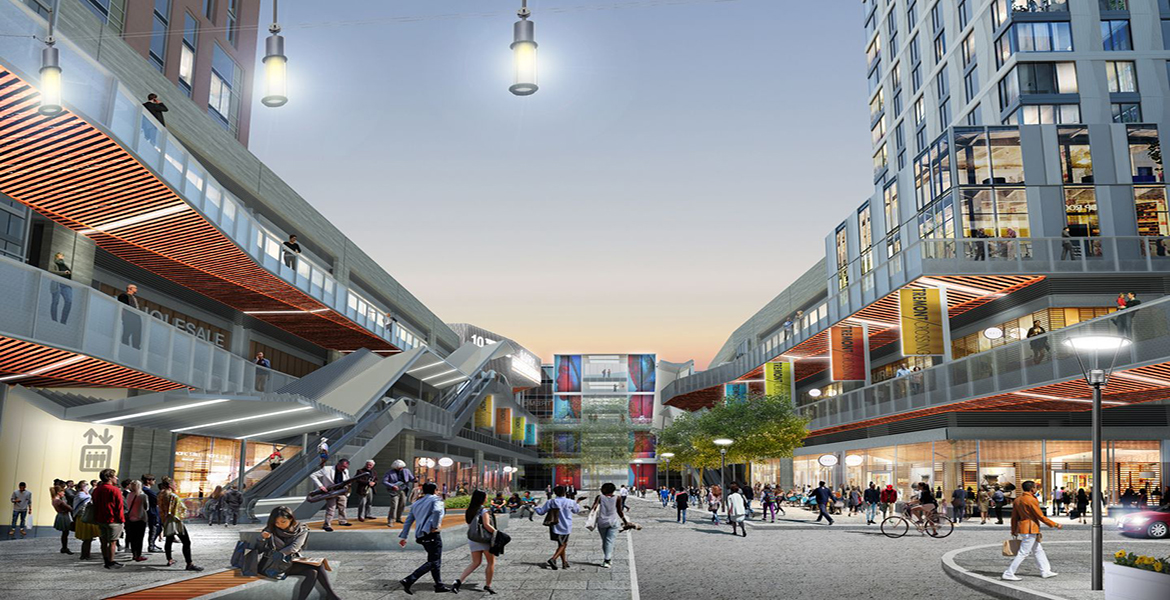Finally, a green light for long-vacant Roxbury parcel
This site could be part of an expressway, or maybe a shopping mall. It might make a nice home for Partners HealthCare, or the state’s transportation bureaucracy. The Krafts’ soccer stadium? Sure, let’s give it a look.
The list of uses proposed over five decades for this unused city-owned property on Tremont Street in Roxbury extends longer than the Orange Line that rumbles by.
Now, we have a concept that’s going to stick. After years of flirtation with a development team, the Boston Planning & Development Agency on Thursday gave final approval to hand over the nearly eight acres. City officials say a long-term ground lease will be signed within the next two months. “Parcel P-3,” as this land-use headache is known in City Hall, can finally become “Tremont Crossing.”
The proposed 1.7 million-square-foot complex is nothing if not ambitious, especially for this part of town: two towers with 700-plus apartments, 108,000 square feet of offices, a museum for African-American culture, a nearly 1,400-space garage. Then there’s 405,000 square feet of retail, fitness, and entertainment tenants — Brooklyn Boulders, Regal Cinemas, CVS, Starbucks, and a long-promised BJ’s Wholesale Club among them.
We’ve heard stories like that one before. This time, city officials say, it’s for real.
Plenty of dreams and visions have been dashed along the way. The city’s redevelopment agency first took control of the property in the 1960s, one more piece in the urban renewal puzzle. The shadow of the doomed Southwest Expressway hung over the land for much of the 1970s, tying things up. A plan with a shopping mall and health center was floated in the 1990s. (The old Whittier Street Health Center sits vacant on the site, although a new Whittier center opened next door in 2012, on a former piece of P-3.)
Elma Lewis Partners has long eyed the site for a new National Center of Afro-American Artists museum. The current Tremont Crossing team began taking shape in 2010 when Elma Lewis joined with the Feldman family’s Feldco Development Corp., which was drawn in part by the proximity to the Ruggles T stop.
All the while, civic leaders grew tired of the tumbleweeds. Former mayor Tom Menino in 2013 famously tried to persuade Partners execs to move there; they relocated their offices to Somerville instead. Deval Patrick attempted to move MassDOT there, but Charlie Baker nixed that idea after becoming governor in 2015.
City officials kept plowing ahead with the Feldco-led development team, aka P-3 Partners. The redevelopment agency extended its “tentative designation” more than 25 times over the past eight years. On Thursday, that tentative designation became a final one: a long-awaited victory for Mayor Marty Walsh’s administration, putting a prominent vacant property to productive use. (Walsh calls it an “important, transformational project” for Roxbury.)
At first glance, the flat property appears easy to develop. But looks can be deceiving. BPDA director Brian Golden points to various discussions with city agencies that had to happen before the deal could be sealed: a plan to move a major sewer pipe; a peace agreement with Boston Public Schools (The Madison Park and O’Bryant high schools are next door.); technical work to lay out a new street grid.
Another crucial factor: Georgia-based Landmark Properties recently agreed to invest as an equity partner in the development’s first phase: all the retail, one of the apartment towers, as well as the garage, museum, and central plaza.
So what’s next? BPDA officials say the ground lease is still being negotiated, but the city will charge below-market rent, and nearby residents will get preference for half of the 100 income-restricted rental units.
The recent success of nearby redeveloped parcels — the Tropical Foods and the Residence Inn on Melnea Cass Boulevard, for example — has helped stoke private-sector interest in a part of the city long overlooked by developers.
This place was always something we passed by on the way to somewhere else, a fenced-in testament to the vagaries of city planning. Perseverance is finally paying off, after the site remained largely untouched as building booms came and went. City blocks don’t get built overnight. But they usually don’t take this long, either.
Source: Boston Globe
Globe Staff, April 14, 2019, 7:19 p.m.
Jon Chesto can be reached at jon.chesto@globe.com. Follow him on Twitter @jonchesto.
